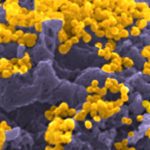Link to Pubmed [PMID] – 27469325
Eur. J. Immunol. 2016 Jul;
Class-switched memory B cells are key components of the “reactive” humoral immunity, which ensures a fast and massive secretion of high-affinity antigen-specific antibodies upon antigenic challenge. In humans, IgA class-switched (IgA(+) ) memory B cells and IgA antibodies are abundant in the blood. Although circulating IgA(+) memory B cells and their corresponding secreted immunoglobulins likely possess major protective and/or regulatory immune roles, little is known about their specificity and function. Here, we show that IgA(+) and IgG(+) memory B-cell antibodies cloned from the same healthy humans share common immunoglobulin gene features. IgA and IgG memory antibodies have comparable lack of reactivity to vaccines, common mucosa-tropic viruses and commensal bacteria. However, the IgA(+) memory B-cell compartment contains fewer polyreactive clones and importantly, only rare self-reactive clones compared to IgG(+) memory B cells. Self-reactivity of IgAs is acquired following B-cell affinity maturation but not antibody class switching. Together, our data suggest the existence of different regulatory mechanisms for removing autoreactive clones from the IgG(+) and IgA(+) memory B-cell repertoires, and/or different maturation pathways potentially reflecting the distinct nature and localization of the cognate antigens recognized by individual B-cell populations. This article is protected by copyright. All rights reserved.


